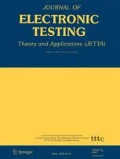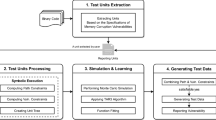Abstract
Drastic device shrinking, power supply reduction, increasing complexity and increasing operating speeds affect adversely the reliability of nowadays Integrate Circuits (ICs). In many modern designs, embedded memories occupy the largest part of the die and comprise the large majority of transistors. Furthermore, memories are designed as tight as allowed by the process, and are therefore more prone to failures than other circuits. Error correcting codes (ECCs) are an efficient mean for protecting memories against failures. A major drawback of ECCs is the speed penalty induced by the encoding and decoding circuits. In this paper, we present an architecture enabling implementing ECCs without speed penalty. Furthermore, as the manual implementation of this solution is impractical for complex System-on-Chips (SoCs), we propose an algorithm and a set of generic rules allowing automatic insertion of the delay-free ECCs in any complex architecture at Register Transfer Level (RTL). With respect to a naive insertion in the design of the new architecture, the algorithm enable up to 20 % hardware reduction. The Finite State Machines (FSM) that controls the new ECC architecture is also generated automatically. Experimental evaluations show that the hardware overhead of the speed penalty free ECCs protected memory compared to a standard implementation of ECC protected memory is about 2.5 % with an additional power consumption of 6 %.













Similar content being viewed by others
References
Baeg S, Wen S, Wong R (2009) SRAM interleaving distance selection with a soft error failure model. IEEE Trans Nucl Sci 56(4):2111–2118
Bajura MA, Boulghassoul Y, Naseer R, DasGupta S, Witulski AF, Sondeen J, Stansberry SD, Draper J, Massengill LW, Damoulakis JN (2007) Models and algorithmic limits for an ECC-based approach to hardening sub-100-nm SRAMs. IEEE Trans Nucl Sci 54(4):935–945
Baumann R (2005) Soft errors in advanced computer systems. IEEE Des Test Comput 22(3):258–266
Baumann RC (2005) Radiation-induced soft errors in advanced semiconductor technologies. IEEE Trans Device Mater Reliab 5(3):305–316
Blum DR, Delgado-Frias JG (2007) Hardened by design techniques for implementing multiple-bit upset tolerant static memories, Circuits and Systems, 2007. ISCAS 2007. IEEE International Symposium on, pp. 2786–2789, 27–30 May 2007
Bonnoit T, Nicolaidis M, Zergainoh N (2011) Towards a tool for implementing delay-free ECC in embedded memories, Computer Design (ICCD), 2011 IEEE 29th International Conference on, pp. 441–442, 9–12 Oct. 2011
Bose RC, Shrikhande SS, Parker ET (1960) Further results on the construction of mutually orthogonal Latin squares and the falsity of Euler’s conjecture. Canad J Math 12:189–203
Calin T, Nicolaidis M, Velazco R (1996) Upset hardened memory design for submicron CMOS technology. IEEE Trans Nucl Sci 43(6):2874–2878
Chang L, Montoye RK, Nakamura Y, Batson KA, Eickemeyer RJ, Dennard RH, Haensch W, Jamsek D (2008) An 8T-SRAM for variability tolerance and low-voltage operation in high-performance caches. IEEE J Solid State Circuits 43(4):956–963
Chang J, Rusu S, Shoemaker J, Tam S, Huang M, Haque M, Chiu S, Truong K, Karim M, Leong G, Desai K, Goe R, Kulkarni S (2005) A 130-nm triple-Vt 9-MB third-level on-die cache for the 1.7-GHz Itanium® 2 processor. IEEE J Solid State Circuits 40(1):195–203
Chen S-K, Fuchs WK (2001) Compiler-assisted multiple instruction word retry for VLIW architectures. IEEE Trans Parallel Distrib Syst 12(12):1293–1304
Chen CL, Hsiao MY (1984) Error-correcting codes for semiconductor memory applications: a state-of-the-art review. IBM J Res Dev 28(2):124–134
Chishti Z, Alameldeen AR, Wilkerson C, Wu W, Lu S-L (2009) Improving cache lifetime reliability at ultra-low voltages. Micro’09, December 12–16, 2009, New York, NY, USA
Datta R, Touba NA (2010) Post-manufacturing ECC customization based on Orthogonal Latin Square codes and its application to ultra-low power caches, Test Conference (ITC), 2010 IEEE International, pp. 1–7, 2–4 Nov. 2010
Dixit A, Wood A (2011) The impact of new technology on soft error rates, Reliability Physics Symposium (IRPS), 2011 IEEE International, pp. 5B.4.1–5B.4.7, 10–14 April 2011
Ghosh S, Basu S, Touba NA (2005) Selecting error correcting codes to minimize power in memory checker circuits. J Low Power Electronics 1:63–72
Gray K (2000) Adding error-correcting circuitry to ASIC memory. IEEE Spectr 37(4):55–60
Hsiao MY (1970) A class of optimal minimum odd-weight-column SEC-DED codes. IBM J Res Dev 14(4):395–401
Ibe E, Chung SS, Wen S, Yamaguchi H, Yahagi Y, Kameyama H, Yamamoto S, Akioka T (2006) Spreading diversity in multi-cell neutron-induced upsets with device scaling, Custom Integrated Circuits Conference, 2006. CICC ’06. IEEE, pp. 437–444, 10–13 Sept. 2006
Ibe E, Taniguchi H, Yahagi Y, Shimbo K-i, Toba T (2010) Impact of scaling on neutron-induced soft error in SRAMs from a 250 nm to a 22 nm design rule. IEEE Trans Electron Devices 57(7):1527–1538
ITRS: International Technology Roadmap for Semiconductors. In Systedminrivers, 2009. http://www.itrs.net
Jahinuzzaman SM, Shah JS, Rennie DJ, Sachdev M (2009) Design and analysis of A 5.3-pJ 64-kb gated ground SRAM with multiword ECC. IEEE J Solid State Circuits 44(9):2543–2553
JEDEC (2006) Measurement and reporting of alpha particles and terrestrial cosmic ray-induced soft errors in semiconductor devices: JESD89A. JEDEC STANDARD, JEDEC Solid State Technology Association, pp. 1–85, No. 89
Kawakami Y, Hane M, Nakamura H, Yamada T, Kumagai K (2004) Investigation of soft error rate including multi-bit upsets in advanced SRAM using neutron irradiation test and 3D mixed-mode device simulation, Electron Devices Meeting, 2004. IEDM Technical Digest. IEEE International, pp. 945–948, 13–15 Dec 2004
Lee SE, Yang YS, Choi GS, Wu W, Iyer R (2011) Low-Power, Resilient Interconnection with Orthogonal Latin Squares. IEEE Des Test Comput 28(2):30–39
Lin S, Kim Y-B, Lombardi F (2011) Modeling and design of a nanoscale memory cell for hardening to a single event with multiple node upset, Computer Design (ICCD), 2011 IEEE 29th International Conference on, pp. 320–325, 9–12 Oct. 2011
Maiz J, Hareland S, Zhang K, Armstrong P (2003) Characterization of multi-bit soft error events in advanced SRAMs, Electron Devices Meeting, 2003. IEDM ’03 Technical Digest. IEEE International, pp. 21.4.1–21.4.4, 8–10 Dec. 2003
Meaney PJ, Swaney SB, Sanda PN, Spainhower L (2005) IBM z990 soft error detection and recovery. IEEE Trans Device Mater Reliab 5(3):419–427
Metra C (2009) Trading off dependability and cost for nanoscale high performance microprocessors: the clock distribution problem. 2009 Workshop on Dependable and Secure Nanocomputing, June 29, 2009, Lisbon Portugal
Muck M, Javaudin J-P (2005) Advanced OFDM modulators considered in the IST-WINNER framework for future wireless systems, 14th IST Mobile and Wireless Communications Submit
Nicolaidis M, Bonnoit T, Zergainoh N-E (2011) Eliminating speed penalty in ECC protected memories, Design, Automation & Test in Europe Conference & Exhibition (DATE), pp. 1–6, 14–18 March 2011
Ooi CY, Fujiwara H (2006) A new class of sequential circuits with acyclic test generation complexity, Computer Design, 2006. ICCD 2006. International Conference on, pp. 425–431, 1–4 Oct. 2007
Radaelli D, Puchner H, Wong S, Daniel S (2005) Investigation of multi-bit upsets in a 150 nm technology SRAM device. IEEE Trans Nucl Sci 52(6):2433–2437
Riedlinger RJ, Bhatia R, Biro L, Bowhill B, Fetzer E, Gronowski P, Grutkowski T (2011) A 32 nm 3.1 billion transistor 12-wide-issue Itanium® processor for mission-critical servers, Solid-State Circuits Conference Digest of Technical Papers (ISSCC), 2011 IEEE International, pp. 84–86, 20–24 Feb. 2011
Sahnine C (2009) Architecture de circuit intégré reconfigurable, très haut débit et basse consommation pour le traitement numérique de l’OFDM avancé. Ph.D. dissertation, Grenoble INP, France
Sahnine C, Javaudin J-P, Degoulet G, Jahan B (2007) OFDM/OQAM transceiver implementation, Design and Architectures for Signal and Image Processing (DASIP 2007), Grenoble, France, November 27–29, 2007
Sinangil ME, Verma N, Chandrakasan AP (2009) A reconfigurable 8T Ultra-Dynamic Voltage Scalable (U-DVS) SRAM in 65 nm CMOS. IEEE J Solid State Circuits 44(11):3163–3173
Smith JE, Pleszkun AR (1988) Implementing precise interrupts in pipelined processors. IEEE Trans Comput 37(5):562–573
Tosaka Y, Ehara H, Igeta M, Uemura T, Oka H, Matsuoka N, Hatanaka K (2004) Comprehensive study of soft errors in advanced CMOS circuits with 90/130 nm technology, Electron Devices Meeting, 2004. IEDM Technical Digest. IEEE International, pp. 941–944, 13–15 Dec. 2004
Author information
Authors and Affiliations
Corresponding author
Additional information
Responsible Editor: M. Violante
Rights and permissions
About this article
Cite this article
Bonnoit, T., Nicolaidis, M. & Zergainoh, NE. Using Error Correcting Codes Without Speed Penalty in Embedded Memories: Algorithm, Implementation and Case Study. J Electron Test 29, 383–400 (2013). https://doi.org/10.1007/s10836-013-5386-8
Received:
Accepted:
Published:
Issue Date:
DOI: https://doi.org/10.1007/s10836-013-5386-8




